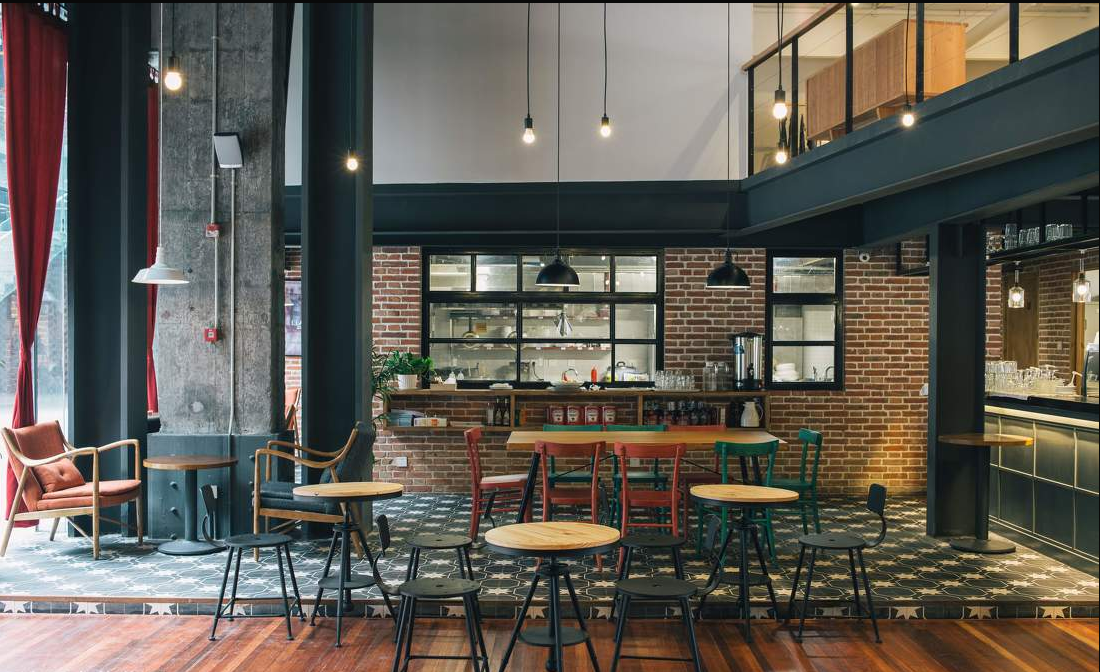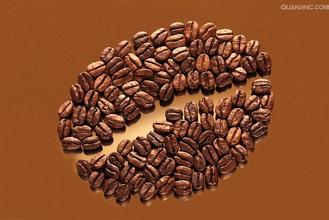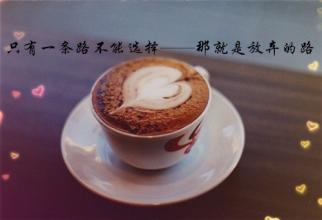Coffee Chain China War
Challenge Starbucks, create a "teahouse-style cafe", coffee chain China is on the brink of war.
Coffee chain China War
□ / Tan Jia, a reporter for this magazine
Chongqing, Guanyinqiao business district.
At three o'clock in the afternoon, the future international coffee shop on both sides of the strait was full of people: "ordering", "waiters add water", cell phone ringtones, the collision of coffee spoons and ceramic cups, the sound of conversation, coupled with jazz, like a rich cup of mocha coffee. On the other side, coffee lovers are crowded in coffee shops such as Shangdao, Milo, Naglan and so on. This area of only 6.8 square kilometers, the concentration of Starbucks, Liangmu Yuan, cross-strait coffee and other brands, the number of stores not less than 25, the degree of fierce competition can be imagined.
There is a glimpse of the leopard in the lower reaches of the most microscopic Chinese coffee chain. There are Starbucks, an international coffee chain with more than a decade of ploughing and more than 500 stores; Starbucks' arch-rival in Italy, Lavazza Espression;, and Shangdao Coffee from Taiwan, with stores all over the country; and sculpture time admired by literary and artistic youth.
There is no doubt that this is a Chinese blowout of coffee brands.
The Challenger of Starbucks
Thirteen years ago, the first Chinese mainland retail store in Beijing International Trade Center, Starbucks Coffee from the United States, officially opened. This is the beginning of the journey of coffee chains in China.
Chinese mainland opened its 500th store on Oct. 25, 2011, its seventh store at Beijing Capital Airport. Wang Jingying, president of Starbucks China, went to the scene to witness the historic moment. After more than ten years of market cultivation, when many people mention "drinking coffee", the first thing that comes to mind is "Starbucks".
However, when Starbucks expands its territory in the front, the covetous new intruders in the rear have assembled.
COSTA, the world's top five coffee chain, celebrated the opening of its 100th store in the Chinese market at Terminal T3 of the Capital Airport on July 5, 2011. Symbolically, the store's former tenant was Starbucks.
Unlike the American style in which Starbucks strives to seize the third remaining space outside the home and office, COSTA strives to create a warm and elegant European coffee environment. COSTA is different from Starbucks in color matching, goods display and service: warm yellowish overall decoration, green and fresh indoor green plants, pleasant, neither humble nor arrogant service.
In terms of store opening strategy, COSTA stores are located close to Starbucks and have opened more than 120 stores in five years, making it one of the fastest growing brands in the industry. The strength of its rapid expansion comes from the "backers" of COSTA-Hualian and Yueda Group. Beijing, Tianjin, Liaoning and other northern regions are developed and operated by Hualian Kashijia established by COSTA and Hualian Group, while Shanghai, Hangzhou, Guangzhou and other southern districts are responsible for by COSTA and Yueda Kashijia established by Jiangsu Yueda Group. Although many good urban areas are occupied by Starbucks, with the vigorous development of commercial real estate and relying on the advantages of Hualian and Yueda in supermarkets, department stores and logistics, COSTA can still enter high-end shopping malls, or even exclusively.
COSTA is seen by the industry as Starbucks' strongest competitor in China. In fact, it is not just COSTA-- that opened its first coffee shop in the mainland in April 2011. The 19-year-old coffee shop, which originated in Central, Hong Kong, has been rated as the "favorite chain coffee shop" by Hong Kong people, and it is still a bit unfamiliar to mainland consumers. But for Starbucks, it is already an old rival. In the ever-changing battlefield of Hong Kong, Starbucks and Pacific share more than 50% market share with 110 stores and 105 stores respectively, and the two sides are neck and neck.
For testing the waters of the mainland, "our target sellers are professionals who have requirements for the quality of coffee, the people next to the table, and the consumer environment." Tang Guojiang, CEO of Pacific Coffee, told the Business reporter. For this reason, the locations of Pacific Coffee stores are concentrated in the high-end business districts of four first-tier cities, Beijing, Shanghai, Guangzhou and Shenzhen.
In addition to its distinct positioning, Pacific Coffee, with a Hong Kong-style shrewd and pragmatic spirit, has also quickly become familiar with the commercial rules of the mainland, just like COSTA-leaning against big trees to enjoy the cool. In 2010, 80% of Pacific Coffee was acquired by China Resources Venture, a subsidiary of China Resources Group. Benefiting from the central enterprise background of China Resources Group, Pacific Coffee easily has the market resource advantage that Starbucks and other brands envy. When negotiating stores with business district properties, Pacific Coffee can join hands with China Resources brands such as Ole, Huarun Hall, Mining and other brands to negotiate prices. Moreover, based on more than a decade of development in the Hong Kong market, Hong Kong real estate developers will report in advance to Pacific Coffee's development projects in the mainland, so that Pacific Coffee can have first-hand information and get stores suitable for operating cafes in a timely manner.
New forces such as arch-rival COSTA and Pacific Coffee are emerging. In the face of prepared competitors, Starbucks successively adopted measures such as changing store styles, launching Chinese cakes, tea drinks and changing bids, but it still could not resist more and more challengers, and the horse racing enclosure between brands was destined to become more and more intense.
to open or find a new path or snap course
Cappuccino, latte, mocha, caramel macchiato. The once unfamiliar coffee term has successfully moved the taste buds of the Chinese people, and "drinking coffee" is gradually becoming a way of life and leisure recognized and accepted by more people. In fact, when foreign brands make a lot of money in China by virtue of strong capital, leading marketing means and strong brand effect, local brands are also rubbing their hands.
In addition to the market dispute, in China, a teahouse cultural country, a variety of local coffee brands have found another way to position their own characteristics in the "teahouse-style cafe".
In the two-to three-hundred-square-meter hall of the Cross-Strait Coffee Future International Store, there is a business atmosphere in the red double sofa, black marble table and light brown decoration. Various business conversations shuttled back and forth among the hollowed-out carved bezels between tables. It's not strange at the next table, and no one will complain to the waiter. There is a lot of traffic, high customer mobility and noisy voices, but white-collar workers don't have to sit upright at Starbucks or chew like they do at a star hotel. No one here pays attention to what the next table is saying and doing, and this environment is no different from that of traditional Chinese teahouses, except that the products sold are replaced by coffee.
In addition to the "teahouse style", there is also the "lovers style".
Hundreds of meters away from the two sides of the strait, the Shangdao coffee sandwiched between the two buildings is not conspicuous, but just walked to the revolving door of the door, the heat rushed in the face. Pink velvet sofas, heart-shaped balloons packed with ceilings, compartments hung with pink veil, and colorful landscape paintings on the walls. Its warm and romantic breath is in sharp contrast to "International Fan" Starbucks or teahouse-style cross-strait coffee, making it a good place for couples to date.
Obviously, under the coffee culture led by Starbucks, cross-strait and Shangdao coffee has found its own cafe characteristics and positioning on the basis of subdividing the audience, and has successfully "exploited" Starbucks' loopholes.
Sisyver Vector Coffee, which has only four stores, takes a different approach-small and beautiful. Relying on Xifu's fame in Guizhou, Sichuan and Chongqing, Vector Coffee, a cafe hidden in the bookstore, quickly accumulated a group of petty bourgeoisie and young and middle-aged fans of literature and art. Vector coffee occupies a small area in Sisyphus bookstore, and coffee is only a regular style. Moreover, books are the core of Sisyphus, and vector coffee is only one of the incidental products. Therefore, in such a market pattern, it is natural that "the eight Immortals cross the sea and show their powers." Vector coffee is positioned as "an extension of cultural experience and reading experience space," Jin Weizhu, the person in charge of Chongqing Sisyver, told Business.
With the fame of Sisyver Bookstore in Chongqing, as well as occasional book signing parties for writers, star meetings, movie viewing, cultural salons and other activities held by the bookstore, Vector Coffee has created an attractive gimmick besides drinking coffee.
According to the Beijing Coffee Industry Association, China's coffee consumption is growing at an annual rate of about 15%, much higher than the 2% worldwide. According to the average level of the international coffee consumption market, the consumption of coffee in mainland China is about 1 trillion yuan. At present, the annual coffee sales is only 70 billion yuan. Obviously, the Chinese coffee chain market is still in the incubation period before the blowout. In the face of such a huge cake, both foreign and local coffee brands will "thrive".
Hand-to-hand combat upstream industrial chain
In 2011, many famous coffee companies were welcomed in Pu'er, Yunnan, which was once famous for its tea. On November 12 of that year, Howard Schultz, president and CEO of Starbucks, personally flew to Yunnan, China. On behalf of Starbucks, he signed a "Memorandum of understanding" with the Yunnan Academy of Agricultural Sciences and the Pu'er municipal government to promote the development of the coffee industry, and plans to build its own raw material supply base in Yunnan. Schultz also said: "this will be Starbucks' first coffee growing base in the world." Coffee grown in Yunnan will be sold not only in China, but also in foreign markets. "
In less than 10 days, Nestl é also signed a memorandum of cooperation with the people's Government of Pu'er City, Yunnan Province, and the two sides plan to carry out in-depth cooperation in coffee talent training, technical assistance, brand building and cultural development in the future.
Whether it is freshly ground coffee in cafes or instant coffee in supermarkets, in fact, most of its raw materials come from Yunnan, China.
As the natural conditions of Yunnan Province are very similar to those of Colombia, a famous coffee bean producing country, Yunnan Province has become the largest coffee bean production base in China, accounting for more than 98% of the coffee beans produced in China. Coffee beans from Yunnan Province are also supplied to the world's five largest coffee giants-Nestle, Maxwell, Kraft Foods in the United States, Newman in Germany and Ikam in Denmark.
With the rising global coffee raw material prices in recent years, various coffee brands continue to expand their sphere of influence in China, and the upstream coffee bean raw materials are becoming the focus of competition. Today, many coffee brands have entered Yunnan, or grow or buy coffee beans themselves. In this round of horse racing enclosure, Hougu Coffee, a "dark horse" from China, has begun to compete with the boss frequently and come to the fore.
Yu Hongtian Industrial (Group) Co., Ltd., a subsidiary of Hougu Coffee, has been engaged in coffee cultivation and processing since the late 1990s, playing the role of a supplier of primary raw materials. A few years ago, foreign coffee beans were favored by the market, and the profits of planting enterprises were closely related to annual product price fluctuations. in order to improve their anti-risk ability and bargaining power, Hougu Coffee decided to enter the field of deep processing and make instant powder (an industrial raw material before instant coffee blending).
In May 2008, Hougu invested in Dehong, Yunnan Province to build the largest instant coffee production line in China. A year later, Hougu became the largest instant powder producer in China.
However, watching Starbucks and other giants conquer the front end of the market, Hougu Coffee decided to join the regiment and open cafes in Kunming and Dehong, the stronghold.
Kunming Cuihu West Road, Hougu Cafe Club was built according to the lake, taking peace in the midst of trouble. In the clubhouse, there are not only a variety of world-famous coffee and coffee utensils, but also the treasure of the town shop specially prepared for coffee enthusiasts-"fragrant cat coffee beans" made only from Yunnan fragrant cats, which are similar to the world-famous civet coffee.
In Dehong Prefecture, Hougu Coffee has established an open-air coffee bar. For urbanites who drink coffee in downtown areas and on the second floor of the business district for a long time, drinking open-air coffee under the natural wind in Yunnan also has a different flavor. As of January 2012, the second China Mangshi (International) Coffee Culture Festival was successfully held in Dehong Prefecture, bringing together many guests at home and abroad and coffee brands in Yunnan Province.
In this accelerated expansion, horse racing enclosure of the coffee chain in China, a more ambitious coffee war is about to begin.

Important Notice :
前街咖啡 FrontStreet Coffee has moved to new addredd:
FrontStreet Coffee Address: 315,Donghua East Road,GuangZhou
Tel:020 38364473
- Prev

Green Mountain expands its share of policy cup coffee in cooperation with Starbucks
Green Mountain Coffee Co. (Green Mountain Coffee Roasters Inc) announced on Wednesday that it will expand its cooperation with Weibo (SBUX), which will provide Starbucks Vue coffee bags for Green Mountain's new Keurig Vue single-cup coffee machine. On the evening of March 21, Beijing time, Green Mountain Coffee (Green Mountain Coffee Roasters Inc) week
- Next

Peru may become the largest exporter of specialty coffee within 6 years
Juan Balias Vazquez, president of the Peruvian exporters' Association (ADEX), said recently that Peru is likely to become the largest producer and exporter of specialty coffee in 2018 if the Peruvian government and entrepreneurs take effective measures to promote the cultivation and consumption of coffee at home and abroad. In 2011, Peruvian coffee exports reached US $1.56 billion, with specialty coffee accounting for 25% of the total coffee exports.
Related
- The ceremony is full! Starbucks starts to cut the ribbon at a complimentary coffee station?!
- A whole Michelin meal?! Lucky launches the new "Small Butter Apple Crispy Latte"
- Three tips for adjusting espresso on rainy days! Quickly find the right water temperature, powder, and grinding ratio for espresso!
- How much hot water does it take to brew hanging ear coffee? How does it taste best? Can hot water from the water dispenser be used to make ear drip coffee?
- What grade does Jamaica Blue Mountain No. 1 coffee belong to and how to drink it better? What is the highest grade of Blue Mountain coffee for coffee aristocrats?
- What are the flavor characteristics of the world-famous coffee Blue Mountain No. 1 Golden Mantelin? What are the characteristics of deep-roasted bitter coffee?
- Can I make coffee a second time in an Italian hand-brewed mocha pot? Why can't coffee be brewed several times like tea leaves?
- Hand-brewed coffee flows with a knife and a tornado. How to brew it? What is the proportion of grinding water and water temperature divided into?
- What is the difference between Indonesian Sumatra Mantinin coffee and gold Mantinin? How to distinguish between real and fake golden Mantelin coffee?
- What does bypass mean in coffee? Why can hand-brewed coffee and water make it better?

